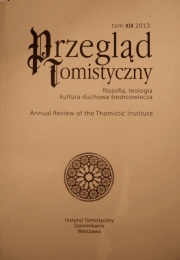Święty Tomasz o sprawiedliwości pierwotnej Adama i Ewy
Saint Thomas on the Original Justice of Adam and Eve
Author(s): Michał MrozekSubject(s): Middle Ages, Theology and Religion, Philosophy of Religion
Published by: Instytut Tomistyczny
Summary/Abstract: This article presents a theological description of ‘original justice’ in the sense used by Thomas Aquinas. This doctrine appears in the contemporary Catechism of the Catholic Church, but it raises a number of questions and concerns, especially when it comes to the beginnings of the human race and the issue of the existence of death. Original justice and its related questions involve fully half of Aquinas’s anthropological considerations. First, Aquinas ponders whether the first man was able to see the essence of God. He responds in the negative: since Adam sinned, he could not yet have seen the beatific vision. Next, Thomas describes the original state of perfection. In Eden, everything was in its proper place, and human capacities were harmoniously ordered. Thomas presents further arguments for the position that God created Adam and Eve as mature people, endowed with knowledge both natural as supernatural. If this were not the case, he states, a harmonious implementation of their original vocation would have been impossible. Thomas emphasizes that special supernatural grace was a necessary element of original justice. This does much to explain the effects of original sin: since supernatural grace guaranteed the integrity of nature, it also assured supernatural immortality. Aquinas can thereby elucidate the literal meaning of the quote from the Book of Wisdom, “God did not make death.”Thomas’s theological approach remains relevant today and suggests the possibility of a literal reading of the state of original justice. This doctrine is not a negation of the natural sciences, which cannot give an account of Eden, but rather a theological extension of the sciences toward a truth that they cannot verify by their own methods. The synthesis of these perspectives provides a renewed look at the book of Genesis and its theological and existential meaning.
Journal: Przegląd Tomistyczny
- Issue Year: 2013
- Issue No: XIX
- Page Range: 339-367
- Page Count: 29
- Language: Polish

